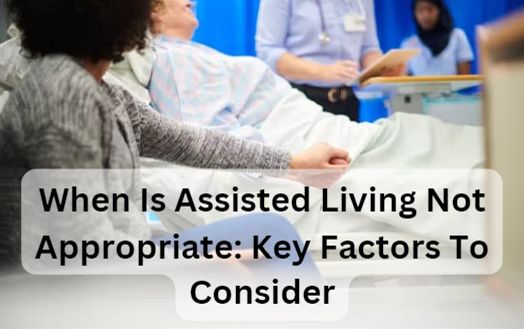Choosing the right care option for an aging loved one can be challenging, and it is essential to understand when assisted living may not be the most appropriate choice. Assisted living facilities provide support for seniors who require help with daily activities, meal preparation, and medication management. However, there are certain situations where assisted living might not be suitable.
One such scenario is when a senior is still primarily independent and only needs minimal assistance with tasks like meal prep or medication management. In this case, assisted living may not be necessary, and a more cost-effective option, like in-home care or an independent living community, may better suit their needs. Additionally, if a senior requires access to around-the-clock skilled nursing care, their care needs may exceed what can be legally provided in an assisted living facility. However, it is important to know when is assisted living not appropriate in order to save time, effort, and money.
Understanding Assisted Living
Assisted living is a type of senior care designed to provide support and assistance to older adults who need help with daily tasks but do not require the intensive care of a nursing home. This includes help with activities such as bathing, dressing, meal preparation, medication management, and more. Assisted living facilities aim to promote independence and quality of life for their residents while ensuring their safety and well-being.
Services Offered
Assisted living communities typically offer a variety of services to meet the needs of their residents. These services often include:
- Personal care assistance (bathing, dressing, grooming)
- Medication management
- Meals and snacks
- Housekeeping and laundry
- Transportation to appointments and errands
- Activities and social events
- 24-hour staff to ensure safety and support
Some facilities may also offer specialized care for residents with Alzheimer’s or other forms of dementia, as well as physical therapy, occupational therapy, or other healthcare services on-site.
Types Of Residents
Assisted living is not a one-size-fits-all solution, and residents at these facilities have varying needs and circumstances. However, there are common characteristics that many residents share:
- Generally in need of assistance with some daily tasks but not extensive medical care
- Looking for a supportive, social environment
- Value their independence but may require help to maintain it
Assisted living may not be appropriate for individuals who require ongoing, intensive medical care or constant supervision, as these needs are better suited for nursing homes or other more specialized care settings. Additionally, those with very minimal support needs may find that they can age in place at home or opt for independent living communities, which offer less assistance than assisted living facilities.
Signs Assisted Living Isn’t Appropriate

While assisted living facilities are ideal for many seniors, there are specific situations in which they may not be the most suitable option. Some seniors may require more specialized care or different living arrangements to ensure proper care and safety. In this section, we will discuss three main reasons why assisted living may not be appropriate, including high-level medical needs, behavioral issues, and advanced memory care needs.
High-Level Medical Needs
Assisted living facilities are designed to help seniors with day-to-day activities and provide basic medical care. However, they may not be equipped to handle residents with high-level medical needs. Examples of high-level medical needs include:
- Chronic and severe medical conditions requiring frequent medical interventions
- Need for 24-hour skilled nursing care
- Usage of complex medical equipment
If a senior requires this level of care, a nursing home or skilled nursing facility may be a more appropriate option.
Behavioral Issues
Seniors with significant behavioral issues may not be suitable for assisted living facilities. These issues can include:
- Aggression or violence towards others
- Substance abuse problems
- Wandering off or leaving the facility without permission
Behavioral issues can pose risks to the individual, staff, and other residents. A specialized care facility, such as a behavioral health treatment center, may better address the needs of seniors with these concerns.
Advanced Memory Care Needs
While some assisted living facilities offer memory care services, they may not be equipped to handle seniors with advanced stages of dementia or Alzheimer’s disease. In these cases, a specialized memory care facility may be more suitable, as they are specifically designed to provide a safe and secure environment with staff trained in managing advanced memory care needs.
In conclusion, assisted living may not be the ideal choice for seniors with high-level medical needs, significant behavioral issues, or advanced memory care needs. It is essential to evaluate each individual’s specific care requirements before selecting a suitable living arrangement.
Alternatives to Assisted Living

There are various options available for those who find that assisted living may not be the most suitable choice for their needs. In this section, we will discuss three alternatives: Skilled Nursing Facilities, Memory Care Units, and In-Home Care Options.
Skilled Nursing Facilities
Skilled Nursing Facilities (SNFs) are designed for individuals who require more intensive medical care than what is typically provided in an assisted living setting. These facilities are staffed with healthcare professionals who can deliver around-the-clock nursing care and offer services such as physical therapy, occupational therapy, and speech therapy.
SNFs might be a better fit for those with chronic health conditions, recent hospitalizations, or post-surgical care needs, as they focus on managing and treating medical issues more actively than assisted living facilities.
Memory Care Units
Memory Care Units specialize in providing care for individuals with Alzheimer’s disease, dementia, and other cognitive impairments. These units often have specially trained staff and adapted environments to ensure the safety and comfort of residents with memory-related challenges.
Residents in memory care facilities benefit from structured routines, tailored activities, and individualized care plans designed to enhance their quality of life and slow cognitive decline. This level of specialized care may not be available in a traditional assisted living setting.
In-Home Care Options
In-Home Care allows seniors to continue living in their own homes while receiving assistance with daily living activities, personal care, and other services based on their individual needs. Some of these options include:
- Home Health Care: Provides medical services such as medication management, wound care, and therapy from registered nurses and licensed therapists.
- Personal Care Assistance: Offers help with activities of daily living such as bathing, grooming, dressing, and mobility support.
- Homemaker Services: Assists with household tasks like meal preparation, laundry, and light housekeeping.
- Adult Day Care: Daytime programs that offer socialization, activities, and care for seniors, allowing caregivers respite time.
In-Home Care may be a suitable alternative for those who wish to maintain their independence and familiar surroundings while receiving the appropriate level of support and care.
Making the Decision

Assisted living may not be appropriate for some individuals, and it’s crucial to assess the needs and preferences of the person in question before making any decisions. In this section, we will discuss various factors to consider and steps to take when evaluating if assisted living is not suitable. We need to determine when is assisted living not appropriate in order to make the decision.
Evaluating Needs And Priorities
Begin by listing the specific needs and priorities of your loved one. This will help you determine if they require the level of support provided by an assisted living facility, or if a different care setting may be more appropriate. Consider aspects such as:
- Physical health and mobility
- Emotional and mental well-being
- Level of independence in daily living activities
- Personal preferences and lifestyle
- Financial resources
Comparing these factors to the services and resources available in assisted living communities can clarify if they align with your loved one’s needs.
Consulting Professionals
It is essential to seek guidance from professionals who are experienced in senior care options. Consulting with your loved one’s medical providers, such as their primary care physician, can offer valuable input on the individual’s health and care requirements. Additionally, consider seeking advice from professionals specializing in senior living, such as geriatric care managers, social workers, or elder law attorneys, to help in navigating housing options and legalities.
Transitioning To A Different Care Level
If you determine that assisted living is not the right choice, it’s essential to explore other alternatives that may better align with your loved one’s needs. Some options to consider include:
- Home care services
- Independent living communities
- Nursing homes or skilled nursing facilities
- Memory care facilities for those with Alzheimer’s or dementia
Remember to thoroughly research and visit the potential care settings to ensure they meet your loved one’s needs and preferences.
Final Thoughts
Assisted living is not suitable for everyone. In some cases, individuals require a higher level of care than what is typically provided in assisted living facilities. It’s essential to consider various factors before deciding if assisted living is the right choice for a loved one.
One important consideration is the person’s medical needs. Assisted living communities are generally unable to accommodate those who need round-the-clock medical supervision or interventions. For individuals who require constant medical care, nursing homes or other specialized care settings may be more suitable options.
Additionally, assisted living may not be the best choice for someone with advanced dementia or other severe cognitive impairments. These individuals might require a secured environment or specialized memory care services, which are typically not available in standard assisted living settings.
Lastly, financial considerations may influence a family’s decision regarding assisted living. As these communities can be expensive, it’s crucial to assess one’s budget and explore alternative funding sources, such as long-term care insurance, veterans’ benefits, or Medicaid programs.
In summary, it’s essential to carefully evaluate the person’s unique needs, medical requirements, and financial circumstances before concluding that assisted living is not appropriate for them. Ultimately, finding the most suitable care setting will ensure their safety, well-being, and quality of life. So now, you already know when is assisted living not appropriate.

